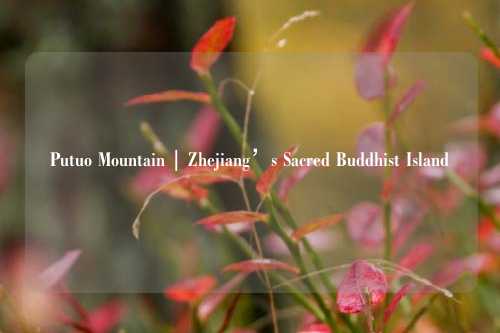Putuo Mountain | Zhejiang’s Sacred Buddhist Island
The Spiritual Heart of Zhejiang
Putuo Mountain, often referred to as "TheHoly Mountain of the Sea," is a revered destination nestled in the misty waters of the East China Sea. As one of China’s four most sacred Buddhist mountains, Putuo Mountain is a place where faith, nature, and history intertwine in a serene harmony. Its lush greenery, golden temples, and tranquil beaches create anOtherworldly atmosphere that has captivated visitors for centuries.

The mountain’s spiritual significance dates back over a millennium, with records of Buddhist activity on the island dating as far back as the Tang Dynasty (618-907 AD). Pilgrims from across Asia have long journeyed to Putuo Mountain to pay homage to the bodhisattva Guanyin, the goddess of compassion, who is believed to reside here. The island’s most iconic symbol is the towering statue of Guanyin, a 32.86-meter-tall figure that stands overlooking the sea, radiating a sense of peace and grace.
One of the first stops for visitors is the Pujing Si (Pilgrimage Temple), a grand institution that has been a focal point of Buddhist activity on the island since its establishment in the Song Dynasty (960-1279). The temple’s architecture is a marvel of Chinese design, with its sweeping tile roofs, ornate carvings, and vibrant painted ceilings. Inside, pilgrims and tourists alike can kneel and pay their respects to the statue of Guanyin, said to be a direct replica of the bodhisattva herself.
Another must-visit is the Fayu Si (Blossom Rain Temple), nestled at the base of Putuo Mountain. This temple is particularly famous for its carvings and vibrant grottos that depict scenes from Buddhist teachings. The Dongyue Dian (Hall of the Eastern Peak) within the temple offers a breathtaking view of the island’s rugged terrain, a perfect spot to reflect and take in the island’s natural beauty.
For those seeking a deeper connection to the island’s spiritual essence, the Guanyin Cave (Guanyin Dong) is a destination. This subterranean cave, hollowed out over centuries by the relentless force of the sea, is adorned with delicate stone formations and the faint echoes of Buddhist sutras. The cave’s ethereal beauty and spiritual energy make it a must-experience for anyone visiting Putuo Mountain.
In addition to its religious significance, Putuo Mountain is a paradise for nature enthusiasts. The island’s lush forests, crystal-clear streams, and pristine beaches offer a reing escape from the chaos of modern life. Hiking trails wind through the mountains, offering breathtaking views of the surrounding sea and opportunities to spot local flora and fauna. The island’s largely undeveloped coastline is a testament to its commitment to preserving its natural heritage, making it a haven for those seeking tranquility.
The richness of Putuo Mountain extends beyond its temples and landscapes. The island’s vegetarian cuisine, served in the many monasteries and restaurants, is a blend of Buddhist culinary traditions and local Zhejiang flavors. Dishes like “sanzhaobing” (three-cup rice) and “tianmu tofu” reflect the simplicity and mindfulness that underpins the island’s spiritual ethos.
A Sanctuary of Faith and Reflection
At the heart of Putuo Mountain’s spiritual allure is the belief in Guanyin’s divine presence. Pilgrims come to the island not only out of devotion but also in search of healing, guidance, and spiritual renewal. The island’s temples and shrines are alive with the soft murmur of Buddhist chants and the faint aroma of incense, creating an atmosphere of reverence and introspection.
One of the most iconic rituals on Putuo Mountain is the Great Buddhist Ceremony, held annually to mark the birthday of Guanyin. During this event, thousands of pilgrims gather at the Haolin Si (Sea-Looking Temple) to participate in a grand Buddhist service, offering prayers and incense while gazing out at the East China Sea. The ceremony is a powerful reminder of the island’s enduring connection to the divine and the universal quest for compassion and enlightenment.
For those who cannot attend the grand ceremonies, the island offers daily opportunities for spiritual practice and reflection. Monasteries and meditation centers provide classes in Buddhist teachings, offering visitors a chance to deepen their understanding of the faith. The serene environment of Putuo Mountain makes it an ideal place to slow down, reflect, and reconnect with one’s inner self.
The island’s Xiangtan Jie (Incense Meeting Festival), held every农历七月 (Seventh Lunar Month), is another highlight. During this period, the island comes alive with vibrant celebrations, as pilgrims light incense, chant sutras, and carry offerings to the temples. The festival is a beautiful testament to the island’s enduring spiritual vibrancy and its status as a sacred haven for Buddhists worldwide.
In addition to its spiritual offerings, Putuo Mountain is also a window into China’s rich Buddhist heritage. The island’s temples and artifacts are a treasure trove of artistic and historical significance, showcasing the ingenuity and devotion of generations. Intricate carvings, vibrant paintings, and ancient texts all tell stories of faith and inspiration, offering visitors a glimpse into the deep spiritual roots of Chinese Buddhism.
For non-pilgrims, Putuo Mountain is just as captivating. The island’s natural beauty, combined with its rich heritage, makes it a destination for travelers seeking an Chinese experience. From the misty sunrise over the sea to the peaceful sunset at the beach, every moment on Putuo Mountain feels like a gift from nature and the divine.
In an increasingly fast-paced and secular world, Putuo Mountain stands as a sanctuary of faith, reflection, and renewal. Whether you come as a pilgrim, a tourist, or simply someone in search of peace, the island’s spiritual energy and natural beauty are sure to leave a lasting impression. Putuo Mountain is not just a destination—it’s a journey inward, a chance to connect with the divine, and a reminder of the enduring power of compassion and faith.
This concludes the two-part soft article on Putuo Mountain. Let me know if you need further adjustments!
















